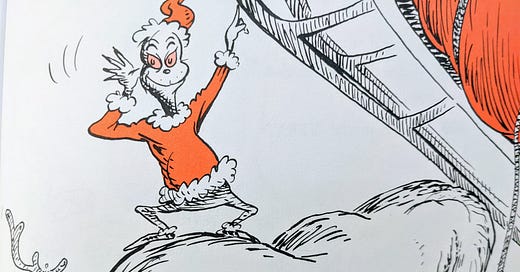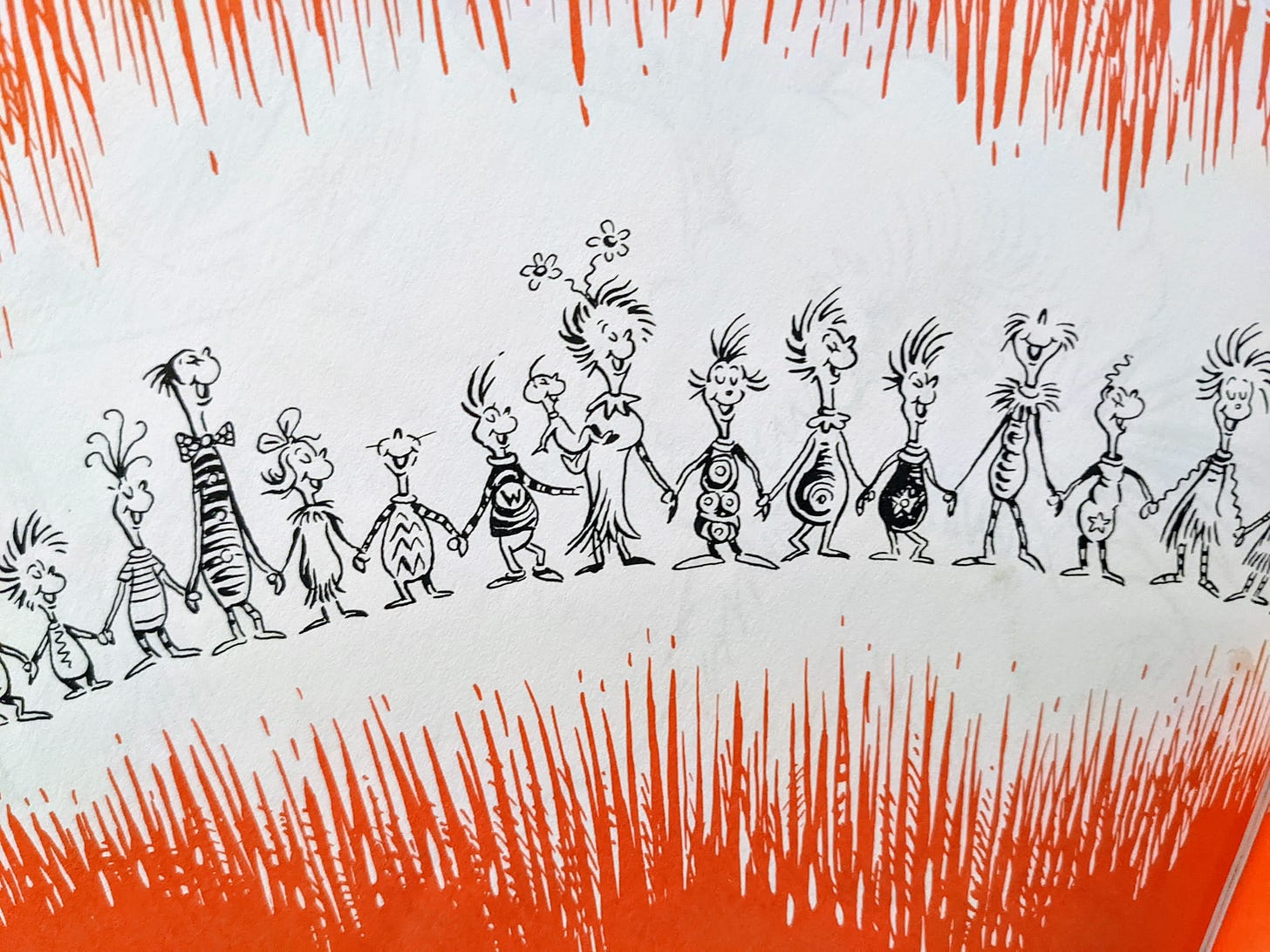The Missing Pages
How did the Whos get from “Hey! What happened to all our stuff?” to singing “Fahoo For-ays”? My vision of one way to bridge that chasm.
In honor of the holiday season and my earlier post on Dr. Seuss, I’d like to dive into the inner lives of the Whos down in Who-ville.
How the Grinch Stole Christmas is buried so deep in the American cultural lexicon that you’d have to work like a dog to avoid the basic gist. For those workers, here’s a handy synopsis.
What I want to examine is what I’m calling “the missing pages.”
After the Grinch steals all the Whos’ Christmas stuff and takes it up Mt. Crumpet to dump it, he stands there, eagerly listening for the lamentation of the Whos to begin, once they’ve realized that “no Christmas is coming:”
He hears something, but not what he expects.
On the VERY NEXT PAGE, we find the Whos singing. (In the cartoon movie version, they sing “Fahoo For-ays, Dahoo Dor-ays” or some such nonsensical but oddly affecting lyric.) They are content, joyous even, beaming beatifically as they hold hands in an enormous circle. The disappearance of their “Christmas stuff” seems to have had no effect whatsoever:
As a kid, and even as a parent reading this story to my kids every year, I never stopped to wonder about the gap between “Hey! What happened to all our stuff?” and “Fahoo For-ays.” How, exactly, does one bridge a chasm of that magnitude?
I suppose that the Whos could be far more enlightened than we ole human beings. But that’s not what Dr. Seuss seems to be getting at here, or for that matter, ever. In fact, his wacky, tufty-headed characters almost always embody some less-than-flattering facet of humanity in order to show us the absurdity of ourselves.
Dr. Seuss wrote the book in 1957, when the post-WW2 manufacturing boom was well underway and we were awash in consumer products. Growing up in America in the latter half of the 1900s, I experienced first-hand the elevation of consumerism to its own religion; among my childhood friends, the day after Christmas always kicked off with a fierce, often demoralizing contest of “Whadja Get?”
At the time, I found comfort in Seuss’s potent parable of what really matters, and I still do.
I find it even more inspiring now, though, as we face a different sort of Grinch: a force of fear-mongering and catastrophizing that is once again threatening to “steal” Christmas. Take your pick of the clever, alliterative headlines from media on both sides: “Omicron Clobbers Christmas” or “Will Omicron Cancel Christmas?”
The short answer: No, it won’t.
We, like the Whos, will find one another in community. Our circle of connected hearts and our song of faith in the light – regardless of what religion we practice or how we access that light – are all that we have ever possessed, and all that will ever matter.
So back to my original question: How do we actually DO it? How do we get from fear of loss (loss of anything – not just material loss) to peace? How did the Whos?
Here’s one possibility. I’ve filled in those “missing pages” with my own verse in the style of Dr. Seuss:
The Whos squinted and yawned at the bright morning sun
As it peeked through the curtains at stop number one.
Near the chimney stood half-asleep Cindy-Lou Who:
Did “Santy Claus” return as he said he would do?
When Cindy-Lou’s parents discovered her there
They marveled to find not their child in despair
But a girl on a mission to help the old Grinch
“’Cause maybe he’s just lost his way by an inch.”
Without batting an eye, Cindy-Lou ran outside
“He’s such a good person, all he needs is a guide,
We’ll sing him a welcome, a song loud and clear,
For surely our singing will bring him back here.”
The notes of that Who-girl were small at the start
But belief in his goodness was huge in her heart.
And soon, one by one, the Whos warbled along
Until the whole town was united in song.
As their voices resound up the mountain, the Grinch hears them… and they melt his heart. But he’s not the only one transformed. The inhabitants of Who-ville look pretty darn joyful, too.
Our power lies in our ability to respond with love, even toward those who seek to take something away from us. The more we love, the more WE are transformed. We move from fearful victim to peaceful warrior.
Not an easy task. In fact, as I read the daily news I have to remind myself to choose love over and over and over.
Loving is also not a passive act. Cindy-Lou Who took action to demonstrate her compassion, and in doing so, initiated a chain reaction that made Who-ville a better place. I’ve learned that I can choose love AND still take action to right wrongs.
A final tip for letting go of fear, courtesy of the Whos: holding hands with one another always, ALWAYS helps.






